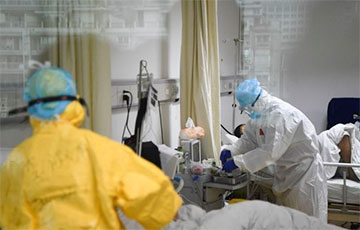“There Was Some Kind of Collapse at Night”: A Woman from Minsk Told the Shocking Truth about the Situation with Coronavirus
47- 9.10.2021, 13:08
- 64,680

A Belarusian woman, 8 months pregnant, fell ill with COVID-19.
A woman from Minsk, 8 months pregnant, contracted coronavirus and was treated for two weeks in Minsk hospital No. 6.
Now she advises everyone to be vaccinated, not to ignore the first symptoms of COVID-19, and to seek medical help on the very first day of their appearance, Radio Svaboda reports.
"Neither nurses nor doctors slept"
"I have never had the covid disease before. I was going to be vaccinated, but due to pregnancy, the vaccination had to be postponed, - says the woman (name and surname are in the editorial office. - RS). - I always wore a mask, I tried to protect myself somehow. And in the end, I got infected by a loved one who does not believe in the existence of coronavirus."
The woman from Minsk said that as soon as her temperature rose to 38°C, she immediately decided to call an ambulance.
“To be honest, I had to persuade the doctors to be admitted to the hospital. I said that I was a first-level contact, but that was not enough. I was lucky that I came across a brigade that helped. They wrote that I have a suspicion of pneumonia since they only accept pregnant women who have had a fever for about 5 days, ”the woman says.
As a result, she was taken to the maternity hospital of the sixth hospital in Minsk. There she was almost immediately given a rapid coronavirus test. The result confirmed the infection. Nevertheless, according to the pregnant woman, health workers recommended she continue treatment at home. She refused.
Later, the woman says, she ended up in the gynecological department on the 6th floor.
It was entirely dedicated to COVID-19 pregnant patients. According to the interlocutor, only one part of it was repaired at that time.
“In the second part, at first, there were household items, tables, and chairs disassembled, rags were hanging. And only recently the rooms were converted into wards - beds with mattresses, bedside tables were brought there. Of course, there were no oxygen machines there,” she says.
After two days of her stay in the hospital, the number of pregnant women who were brought to the department with symptoms of COVID-19 began to rise sharply.
“There was some kind of collapse at night. Neither nurses nor doctors slept. We thought about where to put them. All the corridors were full of pregnant women, who lay under IVs right on the couches. There were not enough places in intensive care. Literally in a couple of days, the entire maternity hospital was already given over to covid patients,” the woman says.
According to her, there were 64 beds in her department, of which only "about 15 percent" were provided with an oxygen supply.
“The rest of the patients stood in the corridors in lines to the oxygen generator. There were 3 of them on the whole floor,” the pregnant woman says.
She says that a woman was in serious condition in the ward at the 25th week of pregnancy.
"She had 40% lung damage. She told me that she was at home in this state for almost a week. She didn't call the ambulance right away but went to the therapist. As a result, she was not even given a PCR test. From the treatment, they prescribed to drink milk with cocoa butter for cough and, if the temperature rises, take antipyretic drugs. Hearing this, I was shocked," says the woman. "After a week with a temperature of 38.5°C, she called an ambulance.
When the doctors arrived, they measured her saturation (blood oxygen saturation), which was already very low, after which she was immediately taken to the hospital. They did a computed tomography (which, by the way, cannot be done for pregnant women) and immediately placed her under droppers."
There were two nurses for more than 60 patients
The medical staff, according to the woman, was not enough in the department. The manager and three doctors came to the "red zone" once a day to make a round of patients. For the rest of the time, 2 nurses remained for six dozen patients. They gave drips, pills, injections, measured blood pressure and temperature, etc.
The woman says that she does not understand how one can work in such conditions. “The medical staff works at 150% of their capabilities. I don't know what motivates them so. I would like to thank them,” she says.
According to her, there were no oxygen masks in the hospital, and “complicated” patients breathed through nasal cannulas. The patients were treated with drugs to reduce blood clotting, vitamin C, paracetamol, and cough tablets.
“In critical cases, diuretic droppers were also put in to remove water from the body and relieve pulmonary edema, so that it was easier to breathe,” she says.
Now the woman is already at home. She says that, although her illness was mild, her physical condition has not yet fully returned to normal.
“Now there is such a “post-covid syndrome” - fatigue, shortness of breath, tests are not ideal. I believe that everyone who has had a coronavirus also needs psychological help. After all, life in a sense is divided into "before" and "after."
In my case, this is primarily anxiety for the child. But the doctors tried to calm me down, they said that it would not affect his health,” says a pregnant woman from Minsk.








